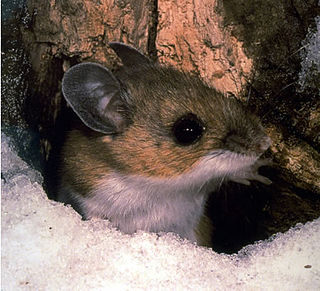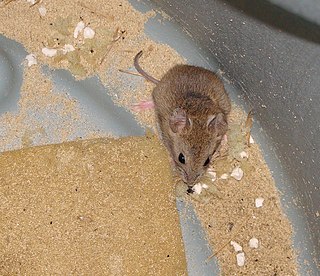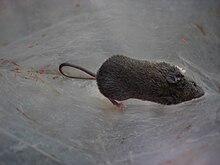
Opossums are members of the marsupial order Didelphimorphia endemic to the Americas. The largest order of marsupials in the Western Hemisphere, it comprises 126 species in 18 genera. Opossums originated in South America and entered North America in the Great American Interchange following the connection of North and South America.

The Neotominae are a subfamily of the family Cricetidae. They consist of four tribes, 16 genera, and many species of New World rats and mice, predominantly found in North America. Among them are the well-known deer mice, white-footed mice, packrats, and grasshopper mice.

Apodemus is a genus of Muridae. The name is unrelated to that of the Mus genus, instead being derived from the Greek ἀπό-δημος.

Dipodoidea is a superfamily of rodents, also known as dipodoids, found across the Northern Hemisphere. This superfamily includes over 50 species among the 16 genera in 3 families. They include the jerboas, jumping mice, and birch mice. Different species are found in grassland, deserts, and forests. They are all capable of saltation, a feature that is most highly evolved in the desert-dwelling jerboas.

The genus Mus or typical mice refers to a specific genus of muroid rodents, all typically called mice, though the term can be used for other rodents. They are the only members of the tribe Murini. However, the term mouse can also be applied to species outside of this genus.
The Cypriot mouse is a species of mouse endemic to Cyprus. Its primary habitat seems to be the vineyards and fields of the Troödos Mountains region.

Vesper mice are rodents belonging to the genus Calomys. They are widely distributed in South America. Some species are notable as the vectors of Argentinian hemorrhagic fever and Bolivian hemorrhagic fever.
The Ethiopian striped mouse or striped-back mouse is a species of rodent in the family Muridae. It is only found in Ethiopia. It was formerly classified in the monotypic genus Muriculus, but phylogenetic evidence supports Muriculus being a subgenus within Mus, the true mice. The Ethiopian striped mouse's natural habitats are subtropical or tropical high-altitude grassland and urban areas. It is threatened by habitat loss.
The Sumatran shrewlike mouse is a species of mouse. It is endemic to Indonesia.
Mus mayori is a species of rodent in the genus Mus, the mice. Its common names include Mayor's mouse, highland rat, and spiny mouse. It is endemic to Sri Lanka.

The steppe mouse or mound-building mouse is a species of rodent in the family Muridae. It is found in grassland and other open areas in Austria, Bosnia and Herzegovina, Bulgaria, Croatia, Czech Republic, Hungary, North Macedonia, Romania, Serbia, Montenegro, Slovakia, Slovenia, and Ukraine.

Nannomys is a subgenus of the rodent genus Mus, the mice. They are known as the African pygmy mice. These species are native to sub-Saharan Africa, where they can be found in many types of habitat. There are 20 species.

Temminck's mouse is a species of the genus Mus and of the subgenus Nannomys. It is found throughout West Africa, Central Africa, and East Africa. An adult generally weighs 0.006 kg.

Mus is a subgenus of the rodent genus Mus.
Pyromys is a subgenus of Mus. Species are endemic to South Asia and parts of Southeast Asia.
Pygmy mouse may refer to:
The Harenna mouse is a species of mouse in the subgenus Nannomys found in the Harenna Forest, Bale Mountains National Park, southern Ethiopia.









